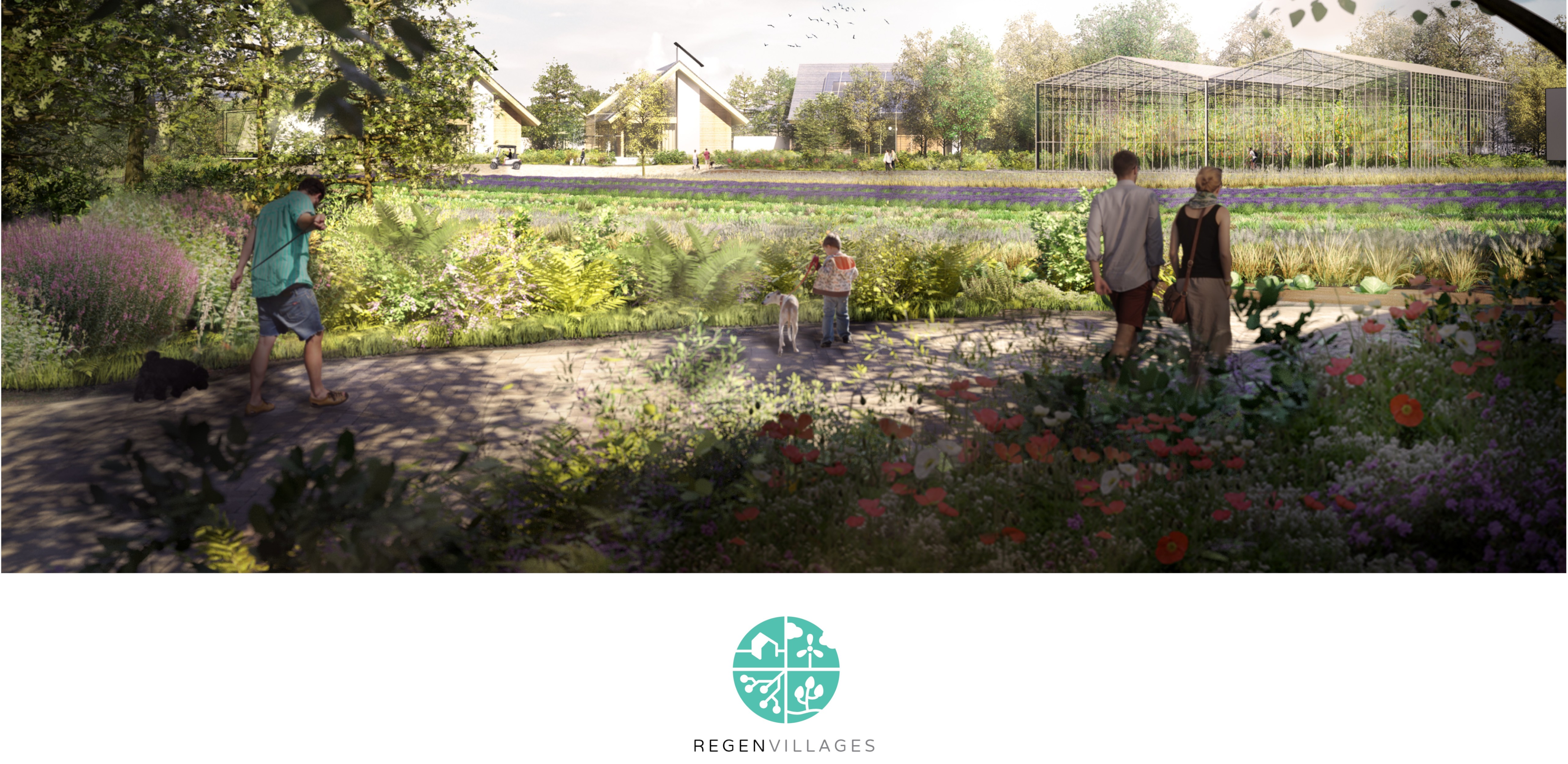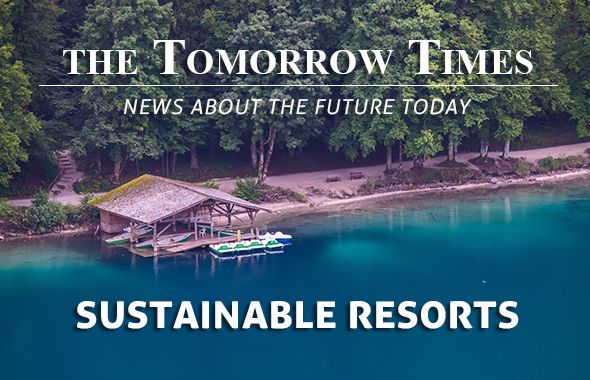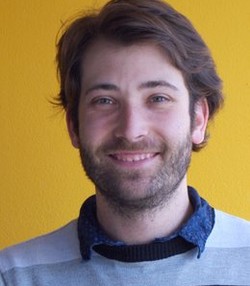This last month of the year, the Tomorrow Times explores holiday resorts as closed systems with the potential to be regenerative environments. These settlements represent experiments for fully sustainable communities: regenerative by design, autonomous in their resource demand (and supply), tightly embedded in the local culture, and a source of new purpose for visitors.
Raising awareness on the impacts of global tourism on ecosystems and the livelihoods of communities has pushed ecotourism as a global trend. Innovative solutions are needed that radically shift how tourism as a practice can transition from a depletive to a regenerative sector.
The tourism industry is embracing sustainable practises, seeking to protect the natural capital it depends upon. The context of the industry means that is has the opportunity to lead and go beyond object based solutions, to embrace the systemic approach needed for real sustainable development. The demand is there. People are increasingly seeking meaningful and inspiring experiences, immersed in nature, cultural involvement and activities to grow and play. We envision a place where one experiences sustainability in a relaxed, healthy, and engaging environment. Resort features currently seek to capture energy reduction, water management, and responsible purchasing, but can improve to cover biodiversity stewardship, on-site food production, and the empowerment of local communities. We look at some emerging examples that we believe to be the ingredients for the regenerative resort of the future.
Follow these periodical monthly updates of tomorrow’s sustainability news today, by subscribing to the Tomorrow Times.
Ingredients for the Resort of the Future
- Cutting energy demand and self-production. The “Svart” is the world’s first Powerhouse hotel, at the foot of the Svartisen glacier that runs through Meløy municipality in northern Norway. The first building to be built after the energy positive Powerhouse standard, located above the polar circle. Not only does this new hotel reduce its yearly energy consumption by approximately 85% compared to a modern hotel, but it also produces its own energy - an absolute “must” in this precious arctic environment.
- Closing the loops, waste a resource. A fully integrated closed-loop (circular) urban metabolism results in self-sustaining living environments in energy, potable water, food production, and waste management. Hotels and resorts are increasingly embedding circular systems into their very own operations. An example is The Inn at Dos Brisas, in Washington, where the waste products of the inn’s equestrian facility are composted on a large scale and used to revive the once-depleted land. Organic fertilizer is later sold at local farmers’ markets.
- Supporting local communities. Ecotourism can shape the future of isolated, disadvantaged communities. Read the story of the breathtakingly Polynesian island of Anaa, recently devastated by a hurricane. A catch-and-release fly fishing tourist program has helped to overcome employment and food security issues, while achieving marine conservation and reinstating ancient traditions.
- Healthy, wellness and engagement. A growing body of empirical evidence is revealing the value of nature experience for mental health. Among the major trends, worth US$4.2 trillion, in the global wellness industry, greater focus on nature activities, meditation and personalized nutrition are all growing in importance.
- Good, clean and fair local food. By embedding ecosystem services deep into the physical infrastructure, healthy organic food can be grown right next to the dinner table. Visible bio-organic innovations bring health, relaxing atmospheres, delicious food, learning, and playful experiences, and a deep sense of wellbeing. See the example of how Slow Food Sustainable farming at the Galapagos, moving aside to sustainability concepts and focusing on gastronomy, opens up to very successful new forms of luxury tourism, while building healthy soil.
- Inspirations for outstanding sustainable resorts. Some examples of sustainability- boosting projects in tourism and hospitality, developed by our team specialized in sustainable estates:
- ReGen Villages, a globally unique masterplan for a self-sustaining housing neighbourhood of 203 houses in the Netherlands. Designed on a 25-hectare site in an area called Oosterwold, just 20 minutes from Amsterdam, it exemplifies affordable, regenerative, and self-sustaining living.
- Arkna Eco-Park, Estonia, provides an exemplary self-reliant living environment, producing diverse food for the surrounding region. A restaurant and hotel, a dairy farm, herb gardens, cheese making, a luxury spa, several hotels, camping and plenty of cultural activities.
- Waddenworld UNESCO Experience Center boosts the local economy by generating more visitors and income for the region. Following our concept, in 2018 the center was financed with € 29 million and the architectural design was made by Dorte Mandrup.

Energy & Environment

- The Great Bubble Barrier. Amsterdam has a bubble barrier to catch canal plastic. The Dutch start-up behind the Bubble Barrier has teamed up with the municipality of Amsterdam and the regional water authority to run a three-year pilot for its technology.
- UN Yearbook of Global Climate Action 2019. Released recently by UN Climate Change, the Yearbook shines a light on current climate action. The book lays down pathways to climate neutrality by mid-Century, required to meet the temperature goals of the Paris Agreement.
- Regional Collaboration Centre Dubai launched. A collaboration between UN Climate Change and the World Green Economy Organization (WGEO) dedicated to advancing the goals of the Paris Agreement in the Middle East, North Africa and South Asia. From fishing village to futuristic metropolis, Dubai has undergone a remarkable transformation from the 70s.
- Colombia's carbon tax could help protect the Amazon rainforest. Colombia generates less than 1% of the world’s carbon pollution, but it’s a leader in using a carbon tax to protect tropical forests.
Business & Economy

- Logistics giant at the centre of circular business. The EU is making Circular Economy the number one priority. It will represent roughly half of the EU’s effort to achieve net-zero carbon emissions by 2050. Australian logistics giant Brambles wants to be at the centre of the business action. The sheer scale of Brambles' logistics business means it can spot better than anyone where inefficiencies in global supply chains lie.
- European Investment Bank ends funding for fossil fuel. The board of the Luxembourg-based lending arm of the European Union has recently decided to approve a new energy policy that includes increased support for clean-energy projects. The bank will not consider new financing of unabated fossil fuels, including natural gas, from the end of 2021.
- A perfect work-life balance. The Netherlands, Italy, and Denmark top the list of the countries with the best work-life balance. Only 0,4% of employees in the Netherlands work more than 50 hours per week. Recently, Microsoft Japan tested a four-day workweek and productivity jumped by 40%. Also at Except, our Friday free working policy has turned our meetings more efficient, our team happier, and boosted productivity.
Science, Technology & Design

- The inventor of the web unveils global plan to save it. Sir Tim Berners-Lee has launched a global action plan to save the web from political manipulation, fake news, privacy violations and other forces that threaten to plunge the world into a “digital dystopia”: the Contract for the Web.
- New bio-inspired control system for robots. A research group at DTU Electrical Engineering has developed a new bio-inspired control system for robots based on the human cerebellum. Through machine learning, brain processes have been converted into an ‘engineering system’ enabling robots to take simple decisions as humans.
- Winner of the international James Dyson award - and $39,000. University student created an alternative stronger than plastic, made out of fish waste.
Urban Environment

- One-quarter of Dubai’s buildings will be 3D printed by 2025. An ambitious 3D-printing strategy was announced in 2016 by Sheikh Mohammed bin Rashid Al Maktoum, vice-president and prime minister of the United Arab Emirates and ruler of Dubai. It will represent a heavily future-oriented way of thinking, aiming to cut costs, labour and emissions.
- All new buildings in the UK to be Passivhaus by 2025? The Liberal Democrats party has put infrastructure investment front and centre of its 2019 general election manifesto. All new homes and non-domestic buildings should be built to a zero-carbon standard by 2021, rising to the more ambitious Passivhaus low-energy standard by 2025.
- The most efficient system for heating zero carbon homes. A five-year research project has analysed 11 systems for delivering heat and water and concluded that standalone ‘autonomous’ heat recovery systems offer the most benefits when considering high-density homes.
Unexpected and Intriguing

- Bilbao's city parks offer brain-training games for the elderly. Loneliness and memory loss are two of the most universal fears about getting old. In Bilbao, Spain, city authorities are tackling both with the launch of a programme of cognitive games for the elderly in two public parks, video.
- Italy becomes the first country to make climate change lessons compulsory for all children. “I want to make the Italian education system the first that puts the environment and society at the core of everything we learn in school.” says the Education Minister.
- Design tool to facilitate Blue Green Infrastructures (BGI). In collaboration with a team of partner organizations (Biodiversa, JNCC, IFLA International Federation of Landscape Architects, and Natural Resources Wales), Except has recently conducted a research, to pinpoint key knowledge as a tool to facilitate BGIs’design processes. Discover more on our project page, or download the full report.
Have you seen a news item suited for 'The Tomorrow Times'? Let us know and we'll consider including it in the next edition.
Previous Tomorrow Times editions
Dec. 23, 2019

